Discours, figure is mandatory reading for anyone who wants to understand the philosophic perspective of Jean-François Lyotard (1924-1998) and to grasp the coherence of his thought. This work, published shortly before L'Économie libidinale (1974), is part of a planned (and never denied at a later date) « practical critique of ideology ». However, Discours, figure deals neither with political economy, nor with history, but rather with painting — or, to be more precise — with this « figural space » present in both discourse and the figure. « There is a radical complicity between the figure and desire » affirms the philosopher but, contrary to Freud, who ignored manifestations of artistic modernity and attempted to reduce such complicity to language and to the « proper form », Lyotard associates the figural with energy dynamics that break the customary codes for the reading of images, regardless of wether these are paintings by Cézanne, Klee or Monory. Discours, figure invites the reader to participate in an « intensive » and unprecedented interpretation of modern and contemporary art.
Jean-François Lyotard is the theorist of the postmodernism school in France. As both a thinker and activist, Jean-François Lyotard participated in the « Socialism or Barbarism » movement during the years he was working as a teacher in Algeria. The author of La condition postmoderne et du Différend, he co-founded, with Jacques Derrida, the International College of Philosophy in 1984.




